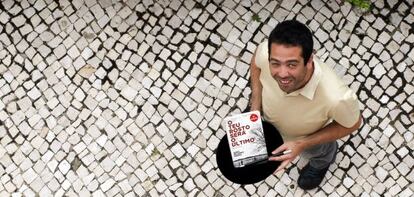Portugal's plight lit a writer's flame
Unemployment meant Lisbon man had no excuses not to pursue his dream


In mid-2008, a telecoms engineer named João Ricardo Pedro, aged 39, was fired from his job. Like many of his fellow Portuguese, he found himself sitting at home with no idea what to do next. Then, one morning, after dropping off his two kids at school and doing some housework, he sat alone in his room and said to himself: "It's now or never..."
"And that morning I started to write," he recalls. "I started with the most obvious things, a kind of story of the things I did daily: buying the groceries, cleaning the house, making meals... For six months that served as training for me. Later, the characters started to spring out of it."
Every day after his wife, an economist, went to work and the children were safely ensconced at school, João Ricardo Pedro would spend the hours between 8.30am and 4pm writing a series of short chapters and embedded stories without any guidelines, preliminary notes or anything that could remotely be considered a plan in any sense of the word. He simply trusted his own instinct as a new novelist.
The result is O teu rostro será o último (or, Your face will be the last), a delicious novel that just won the latest Leya Book Award, the biggest literary competition in the country, with a prize of 100,000 euros for the winner.
Besides that, it was the bestselling book at the recently ended Lisbon Book Fair and the hottest thing to hit the literary industry this season.
Like many people, the author had always toyed with the idea of becoming a novelist. "I thought of it when I was in my twenties, but I couldn't make up my mind. Later came work and the kids, and I just couldn't. I wasn't able to spend two hours on it after work, as some people do. Perhaps it was because I lacked the courage and I was too scared to maybe realize, as soon as I got started, that I was no good."
Maybe before I lacked the courage to realize that I was no good"
But losing his job took away his excuses. "It's funny, because what attracted me the most about the whole thing was the fact that I could spend my mornings at home, writing and doing nothing else. That's what clinched it for me."
João Ricardo Pedro is kind, friendly, welcoming and engaging. The newfound novelist lives in a middle-class apartment in Lisbon, with small children's toys lying in the corners and lots of books and CDs sitting on shelves. "I wrote all the chapters at the same time, so I watched it grow in one piece, and I was as surprised as the next guy [at the successful result]," he says.
His wife, Isabel, convinced him to hurry up and finish it so he could enter it in the Leya competition. "So I wrote at all hours of the day, even on weekends. And I sent it in."
And he won. And a country that is mired in a deepening crisis, with an international troika watching its every budgetary move, growing unemployment and thousands of young people emigrating to Angola, Brazil and France, among other destinations, welcomed the good news with open arms: an unemployed man who turns his life around and pulls himself out of the hole.
Although my wife is an economist, she did not look at my risk premium"
João Ricardo Pedro appeared on all the networks and gave scores of interviews in which he told people about his life and brought some hope to a strangled society.
At the awards ceremony a few weeks ago, João Ricardo Pedro made an ironic reference to Portugal's dramatic situation in front of the prime minister, Pedro Passos Coelho, a conservative who has championed the need for spending cuts. "Although my wife Isabel is an economist, she did not look at interest rates or the risk premium, and contravening austerity laws, she gave me all the freedom, the time and the support necessary to complete the book," he said with ironic gratitude.
Now, sitting at the desk where he is working on his second novel, which he as yet knows nothing about ("I'm still at a very preliminary stage; I'm letting things flow") João Ricardo Pedro extrapolates his own story and turns it into a tenet of international policy: "Maybe what we need is some trust in ourselves and trust in one another to pull out of this situation. But it seems like our leaders don't trust each another, that Germany's leader doesn't trust the Greek leader and vice versa. And without that trust, there is nothing to be done."
Tu suscripción se está usando en otro dispositivo
¿Quieres añadir otro usuario a tu suscripción?
Si continúas leyendo en este dispositivo, no se podrá leer en el otro.
FlechaTu suscripción se está usando en otro dispositivo y solo puedes acceder a EL PAÍS desde un dispositivo a la vez.
Si quieres compartir tu cuenta, cambia tu suscripción a la modalidad Premium, así podrás añadir otro usuario. Cada uno accederá con su propia cuenta de email, lo que os permitirá personalizar vuestra experiencia en EL PAÍS.
¿Tienes una suscripción de empresa? Accede aquí para contratar más cuentas.
En el caso de no saber quién está usando tu cuenta, te recomendamos cambiar tu contraseña aquí.
Si decides continuar compartiendo tu cuenta, este mensaje se mostrará en tu dispositivo y en el de la otra persona que está usando tu cuenta de forma indefinida, afectando a tu experiencia de lectura. Puedes consultar aquí los términos y condiciones de la suscripción digital.








































